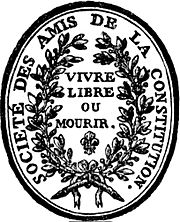Feuillants Club
|
Feuillants Club
Club des Feuillants |
|
|---|---|
 |
|
| President |
Antoine Barnave, Alexandre de Lameth, Adrien Duport |
| Founded | 18 July 1791 |
| Dissolved | 21 September 1792 |
| Merger of | Moderate Jacobins, Monarchiens |
| Headquarters | Rue Saint-Honoré, Paris |
| Newspaper | La Gazette |
| Ideology |
Monarchism Constitutionalism Liberal Conservatism |
| Political position | Right-wing |
| Colours | Blue, white |
The Society of the Friends of the Constitution (French: Société des Amis de la Constitution), better known as Feuillants Club (French pronunciation: [fœjɑ̃] French: Club des Feuillants), was a political grouping that emerged during the French Revolution. It consisted of monarchists and reactionaries who sat on the right of the Legislative Assembly of 1791. It came into existence when the left-wing Jacobins split between moderates (Feuillants), who sought to preserve the position of the king and supported the proposed plan of the National Assembly for a constitutional monarchy, and radicals (Jacobins), who wished to press for a continuation of direct democratic action to overthrow Louis XVI.
The Feuillant deputies publicly split with the Jacobins when they published a pamphlet on 16 July 1791, protesting the Jacobin plan to participate in the popular demonstrations against Louis XVI on the Champs de Mars the following day. Initially the group had 264 ex-Jacobin deputies as members, including most of the members of the correspondence committee.
The group held meetings in a former monastery of the Feuillant monks on the Rue Saint-Honoré, in Paris, and came to be popularly called the Club des Feuillants. They called themselves the Amis de la Constitution. The group was led by Antoine Barnave, Alexandre de Lameth and Adrien Duport.
As the Constitution of 1791 began to take its final shape, many erstwhile radical deputies such as Le Chapelier and Barnave wished for the central role played by such popular societies as the Jacobins early in the French Revolution to come to an end. The activism of the People had been vital to the preservation of the Revolution in the early days of the National Assembly, but their purpose had been fulfilled, and it was time for direct democracy to give way to the leadership of elected representatives. This conviction was greatly affirmed with the Champs de Mars Massacre (17 July 1791).
...
Wikipedia
